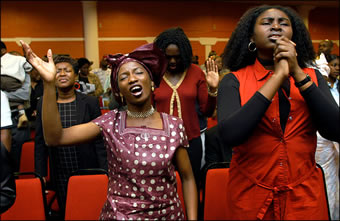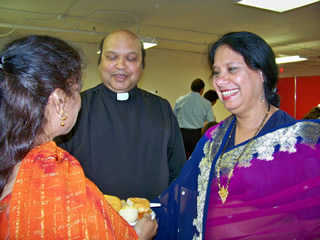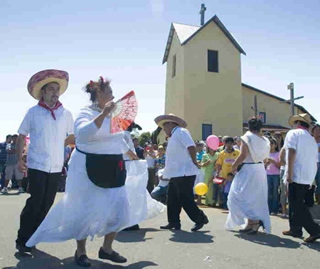"Christ is In All"
A Runaway Slave Returns Home
For Sunday August 1, 2010
Lectionary Readings (Revised Common Lectionary, Year C)
Hosea 11:1–11 or Ecclesiastes 1:2, 12–14; 2:18–23
Psalm 107:1–9, 43 or Psalm 49:1–12
Colossians 3:1–11
Luke 12:13–21
When my family moved to Moscow on September 7, 1991, there were only two English-speaking Protestant churches in that city of 10 million people. The Catholic church had started in 1934, but since we were Presbyterian we attended the Moscow Protestant Chaplaincy that was founded in 1962. My wife taught Sunday school, and for two years I chaired the church council. In response to the economic wreckage that had devastated so many people in those tumultuous days, the church started a soup kitchen program that fed 1,000 Russian pensioners a day, six days a week.
The most energizing dimension of the MPC was its social, cultural, ethnic and economic diversity. People from about 30 countries worshipped there, with about half the congregation coming from fifteen or so African countries. Ambassadors, students, business executives, missionaries, NGO staffers, and even a few local Russians eager to practice their English all worshipped together.
 |
A few years later, the Episcopal church began its own services. When our pastor visited them for a Christmas service, he brought back this report: “Well, the good news is that everyone there was white like me; the bad news is that everyone there was white like me.” His wry joke illuminates our propensity to exclude others not like us, and the call of Jesus to do just the opposite, to embrace the "other."
In this week's epistle Paul describes a radical alternative to excluding others who aren't like us. For those who follow Jesus, writes Paul, "there is no Greek or Jew, circumcised or uncircumcised, barbarian, Scythian, slave or free, but Christ is all, and is in all" (Colossians 3:11). The nearly identical verse in Galatians 3:28 adds that "there is neither male nor female." I like to add our modern equivalents — no Iraqis or Iranians, no North Koreans or North Vietnamese, no blue bloods or blue collar, no imperialists or terrorists, no gays or straights, no youth or elderly.
With a single sentence Paul repudiates the idea that humanity is fated to exclude one another because of paranoia and stereotypes, that there is an inevitable clash of civilizations, or that class warfare is unavoidable. Contrary to the relentless propaganda that we are force fed, we need not succumb to race-baiting, to gay-bashing, to ethnic slurs, or to demonizing a nation as an enemy, an "evil empire," or "axis of evil." Instead of insisting that "you are either with us or against us," the Christian says, "I am unconditionally for you, no matter who you are, where you live, or what you've done. And God is for you far more than I could ever be for you."
Paul challenges the believers at Colossae to see every person as a human being who bears "the image of its creator" (3:10). Christ "is all," writes Paul, and he is also "in all." To the Ephesians he employed a different but equally subversive metaphor; he says that Christ himself is our peace and that he shattered the many "dividing walls of hostility" that raise barriers between people (4:11).
Paul was not a romantic idealist mouthing pious platitudes, nor was he blind to the actual social conditions that existed in the churches of his day. He warned the Colossians about the "anger, rage and malice" that destroys communities. He didn't imagine that gender identity was unimportant, that ethnicity shouldn't be celebrated, or that religion or your mother tongue don't matter. He didn't say that we should repudiate these important markers of human identity with a bland uniformity.
 |
Instead of repudiation Paul recommends renewal. Instead of letting these very real and powerful aspects of being human plunge us into identity violence, Paul urges us to renew or transform them. He describes this renewal in several ways. It's like moving from death to life, like putting off your "old" self and putting on a "new" self, or like living in a "heavenly" rather than in an "earthly" way. It's nothing less than a return to or rediscovery of your basic humanity. If you look carefully, you can already see glimpses of this renewed social reality.
We see it among our children. When I taught at a seminary in Nairobi in the summer of 1990, our family lived in the dormitory with students and their families. My son was seven at the time, and next to eating the delicious mandazi that were served at tea time every morning, his favorite part of the day was playing soccer with his Kenyan buddies. We have a "team" picture in which he's the only white boy among a dozen African kids. The first time we showed this picture to our friends back home he eagerly identified himself: "I'm the one in the red shirt!" I think that was the most color blind experience I've ever had.
For the most part, though, our exclusionary categories remain deeply entrenched and unusually powerful in our every day social relations. Commenting upon Galatians 3:28, St. Augustine observed how they are “embedded in our mortal interactions.” They characterize much if not most of the world today. They also characterize much of Christianity. Bob Abernethy, bureau chief for NBC News in Moscow and fellow parishioner at our MPC, once remarked to me about our Moscow church, “yes, the diversity at MPC is amazing, but it is really limited to the one hour a week here at church.” Sad to say, we believers not only acquiesce to these exclusionary tendencies; we often perpetuate them.
Paul envisioned a dramatically different set of social relations for Christians. Toward the end of his letter to the Colossians, there's a fascinating biographical footnote that suggests how their Christian community grappled with these matters of exclusion and embrace.
Paul had written to them from prison (4:18). In fact, he had never visited their church (2:1). While in prison, he had befriended and converted a runaway slave named Onesimus, who, as it turns out, was from Colossae. When Paul sent his letter to Colossae with the courier Tychicus (4:7), he shocked the Colossian church by writing that he was also sending the fugitive Onesimus back with Tychicus. He describes Onesimus as “our faithful and dear brother, who is one of you” (4:9). As one commentator puts it, “it is a striking comment on how the apostle’s thought has leapt across the barriers of social distinction, that he can describe the runaway slave as one of you.”*
 |
And there's more. The shortest book in the Bible is addressed to Philemon, the slave owner of Onesimus, who also worshipped at the same Colossian church. Paul makes a pun on Onesimus’s name to drive home his point. True, he was a runaway slave who ended up in prison. But now in Christ he was Paul’s son, his “very heart.” True, he used to be “useless” to Philemon, but now in Christ he is “useful” to both Paul and Philemon (in Greek, onesimus means “useful”). Philemon has Onesimus back, “no longer as a slave, but better than a slave, as a dear brother” (Philemon 16). Paul urged Philemon to embrace his fugitive slave as more than an equal.
How might we experience Paul’s radical social vision? How do we move from exclusion to embrace? Humanly, I think it's impossible, until we plumb the depths of his insistence that in some mysterious way, “Christ is all, and is in all” (Colossians 3:11).
* Herbert Carson, The Epistles of Paul to the Colossians and Philemon (Grand Rapids: Eerdmans, 1972), p. 99.
For further reflection
* See the movie Encounter Point, a film about many Israeli and Palestinian people that are working together to end violence in their region.
* See the book by Kevin Roose, The Unlikely Disciple; A Sinner's Semester at America's Holiest University (New York: Grand Central Publishing, 2009). Roose was a sophomore at Brown University who did a "domestic semester abroad" at Jerry Falwell's Liberty University after he admitted that he didn't know a single evangelical Christian and that instead he resorted to stereotypes about them.
* Contemplate the words of CS Lewis from The Joyful Christian: "There are no ordinary people. You have never talked to a mere mortal. Nations, cultures, arts, civilization — these are mortal, and their life is to ours as the life of a gnat. But it is immortals whom we joke with, work with, marry, snub, and exploit — immortal horrors or everlasting splendors. This does not mean that we are to be perpetually solemn. We must play. But our merriment must be of that kind (and it is, in fact, the merriest kind) which exists between people who have, from the outset, taken each other seriously — no flippancy, no superiority, no presumption. And our charity must be a real and costly love, with deep feeling for the sins in spite of which we love the sinner — no mere tolerance or indulgence which parodies love as flippancy parodies merriment. Next to the Blessed Sacrament itself, your neighbor is the holiest object presented to your senses."
Image credits: (1) EveryScreen.com; (2) Church of the Incarnation; and (3) Chatham County, NC.





